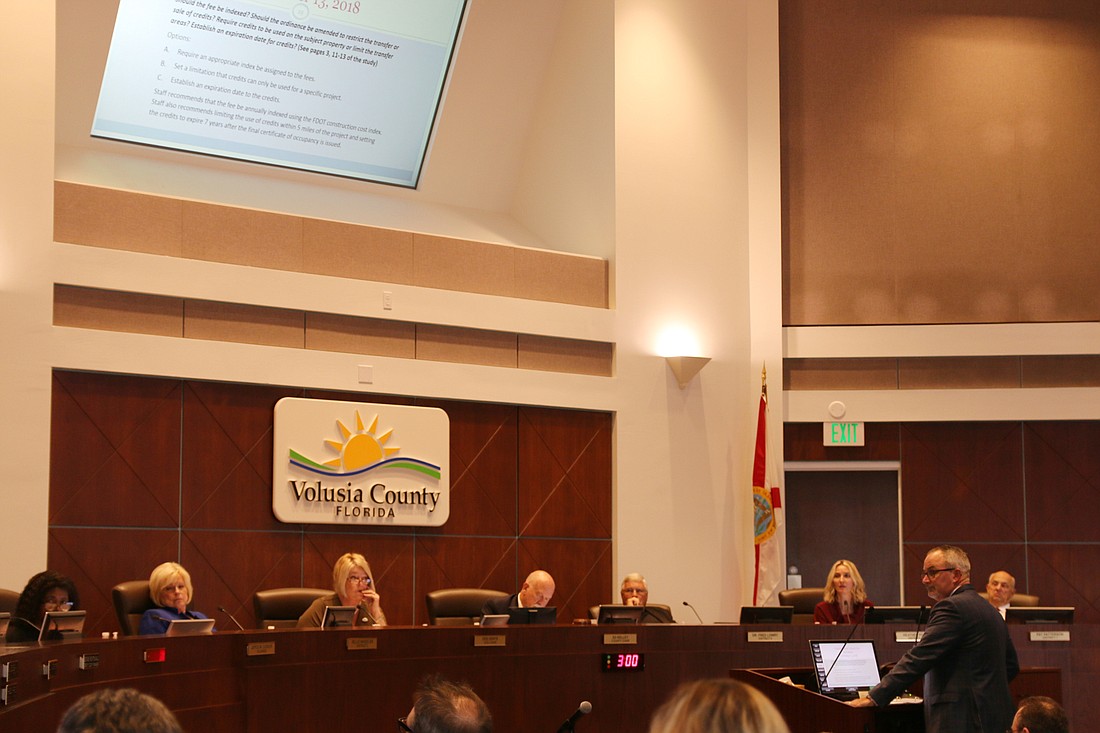- April 26, 2024
-
-
Loading

Loading

The Volusia County Council unanimously voted to increase impact fees at its meeting on Tuesday, Nov. 13, but the full increase won't take effect until 2020: Impact fees will be phased over the next two years.
For the last six months, impact fees have been in the spotlight after a 2016 study recommending drastic increases resurfaced. This occurred as the council was considering approving putting a half-cent sales tax referendum to fund county-wide infrastructure projects on the November ballot; it was consequently put on the back-burner. From October 23 to 30, the county held four workshops on impact fees to inform the public of the most recent study, which proposed an increase that would bring over $13 million in revenue — a little over $6 million more than the estimated revenue brought in with the county's 15-year-old fees.
Though the majority of citizen feedback, from the workshops and the council meetings, conveyed that the public wanted impact fees to be increased in full as soon as possible, the council decided that fees will be increased by 75% of the proposed rate in 2019, with the remaining 25% to take effect in 2020. It will take 90 days for the impact fees to be adopted. The Volusia County Association for Responsible Development and the Volusia Building Industry Association both asked the council to consider a phasing of the fees.
"We're your staff," said Clay Ervin, county director of Growth and Resource Management. "We're going to do whatever policy you give us, but I can tell you, we always want money whenever we can get it."
Ervin asked that if the council chose to phase the fees, which it ultimately did, that it implement them fully before the next four years, since another update to the fees is scheduled to take place then.
Mary Anne Connors, former deputy county manager, said anything less than a full implementation of the study moves the burden to someone else, "either by cost-shifting or by deferral of actual work and that costs the entire community." She said this is the time to catch up and "correct" where the community needs to be in the future.
"This is the time when government is supposed to do government's business, and catch up and fund the infrastructure needs of the community," she said. "That infrastructure supports all business."
Several of the council members stated that increasing impact fees will not be the sole solution. Councilwoman Deb Denys said that the revenue generated from the increase would not fund an entire road project, using the widening State Road 40 from four to six lanes on Williamson Boulevard to Breakaway Trails as an example.
She said this is a 33 million project alone, and to widen the rest of the state road would be another $112 million. Denys added that it costs about $3.5 million to pave one mile of road, so the additional revenue from impact fees wouldn't amount to much.
"So anybody that thinks this is a panacea and this is going to fix everything, it's not," Denys said, but that it was a starting point.
County Councilwoman Heather Post said that no one is expecting impact fees to be "the magic wand" for infrastructure needs.
"I think we're missing the point," Post said. "The point here that I see is that there are decisions in areas within the county that we have let go by without addressing for various reasons, and we find ourselves in the situation that we're in because we have not addressed certain issues for far too long."
Though initially Council members Joyce Cusack, Billie Wheeler and Fred Lowry were for implementing the impact fees in full, after Denys made a motion to phase them, the vote suddenly became unanimous.
Once implemented fully in 2020, the council voted to adjust them annually using the Florida Department of Transportation construction cost index, but, it capped the possible index at an 8% increase, and established a minimum of 3%.
The council also voted for keeping impact fee credits within the project's zone, and established an expiration date of seven years after the final certificate of occupancy is issued.